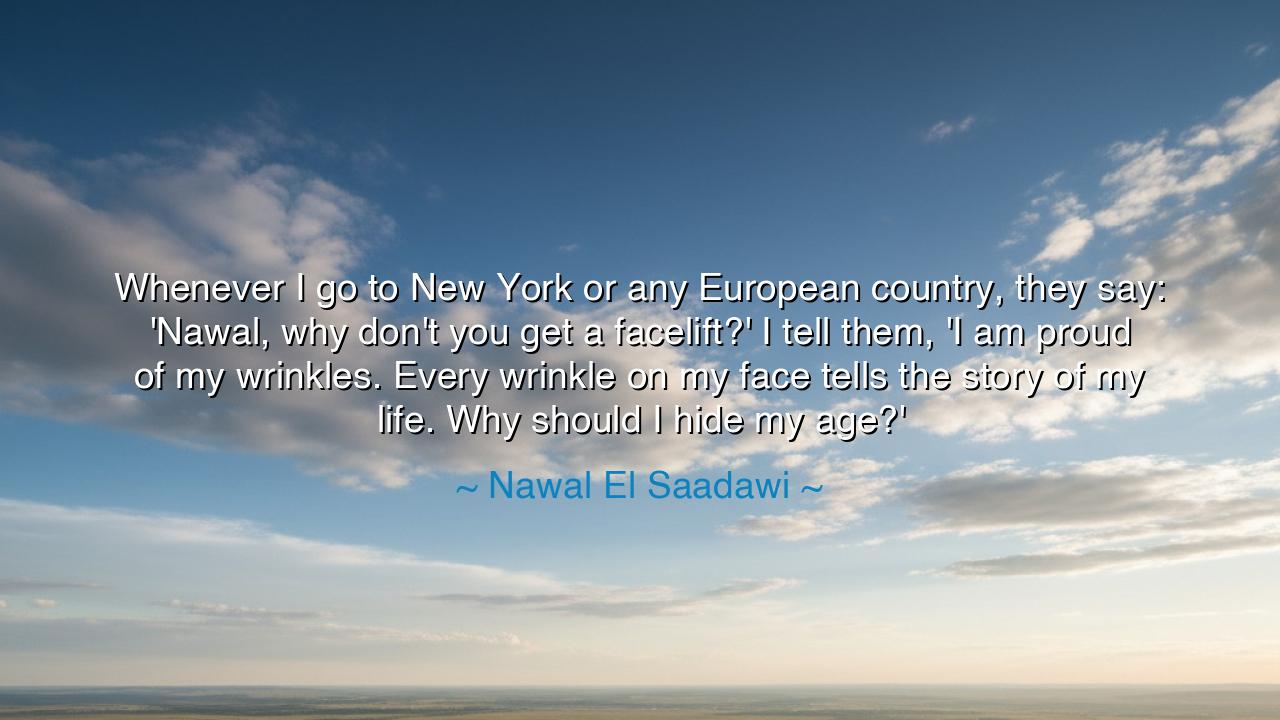
Whenever I go to New York or any European country, they say:
Whenever I go to New York or any European country, they say: 'Nawal, why don't you get a facelift?' I tell them, 'I am proud of my wrinkles. Every wrinkle on my face tells the story of my life. Why should I hide my age?'






"Whenever I go to New York or any European country, they say: 'Nawal, why don't you get a facelift?' I tell them, 'I am proud of my wrinkles. Every wrinkle on my face tells the story of my life. Why should I hide my age?'" - Nawal El Saadawi. These words, spoken by the renowned Egyptian writer and feminist, are a powerful declaration of self-acceptance and the refusal to conform to societal pressures. El Saadawi speaks with conviction about the beauty of embracing one’s age and experience, rejecting the idea that physical appearance should be used to define one’s worth. Her wrinkles, she asserts, are not a symbol of decay or loss but a testament to the richness of her life, to the stories, struggles, and lessons she has gathered over the years. In a world that so often worships youth and perfection, El Saadawi's refusal to hide her age is a bold act of reclamation, reminding us all that wisdom is earned, not disguised.
Consider the life of Maya Angelou, a woman whose face, marked by the passage of time, radiated the very wisdom El Saadawi embraces. Angelou, with her wrinkles, her grace, and her indomitable spirit, became a symbol not only of strength but of the beauty of age. Each line on her face told the story of the trials she had overcome, the struggles she had faced, and the triumphs she had achieved. Angelou’s life was a testament to the truth that wisdom, experience, and resilience do not reside in the unmarked skin of youth but in the lived years—in the stories of those who have fought, learned, and grown through time. Like El Saadawi, Angelou was unafraid of the marks left by age, for she understood that each wrinkle was not a flaw, but a badge of honor, a sign of a life well lived.
El Saadawi’s rejection of the facelift symbolizes more than just physical appearance; it is a philosophy of life. It speaks to the power of accepting oneself as one is, without the pressure to conform to societal ideals of beauty. She proudly wears her wrinkles as symbols of her authenticity. In a world that often encourages the masking of age and imperfection, El Saadawi’s words challenge us to reconsider the value of true beauty, the beauty that comes not from a youthful face, but from a face that has embraced its journey, and in doing so, has gained strength, confidence, and a deeper understanding of the world.
Consider the Greek philosophers, who spoke not of youth as the highest form of beauty but of wisdom and integrity. Socrates, though his body grew frail and his appearance aged, was revered not for his youthful looks, but for the depth of his thought, for the legacy of his teachings. His face, like El Saadawi’s, was marked not by the absence of age, but by the presence of intellect, virtue, and a life well lived. Socrates was not concerned with hiding the signs of time, but rather with expanding the mind and the spirit. His wrinkles, metaphorically speaking, were not deficiencies, but markers of a life devoted to learning and sharing knowledge.
The lesson from El Saadawi’s words is one of pride and self-acceptance. In a world that often seeks to erase the signs of aging, we must learn to embrace our wrinkles, our scars, and our imperfections, for they are the outward symbols of the experiences and wisdom we have gained. Our faces are not meant to be preserved in a state of eternal youth, but to reflect the journey we have taken, the lessons we have learned, and the strengths we have developed. To hide the marks of age is to deny the truth of who we are. Instead, we should stand proudly in our aging, recognizing that youthful beauty is fleeting, but the beauty of wisdom endures.
Thus, the practical lesson for us all is to accept ourselves as we are, with all the marks that time has left on our bodies and spirits. Let us not fear aging or the wrinkles that come with it, but let us wear them as symbols of honor and experience. Let us also remember to live with purpose, to gather stories and lessons along the way, so that when we look at our own reflection, we see not the signs of decline, but the evidence of a life well lived, full of wisdom, resilience, and authenticity.






AAdministratorAdministrator
Welcome, honored guests. Please leave a comment, we will respond soon